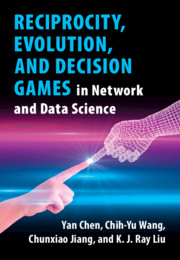Book contents
- Frontmatter
- Contents
- Preface
- 1 Basic Game Theory
- Part I Indirect Reciprocity
- Part II Evolutionary Games
- Part III Sequential Decision-Making
- 11 Introduction to Sequential Decision-Making
- 12 Chinese Restaurant Game: Sequential Decision-Making in Static Systems
- 13 Dynamic Chinese Restaurant Game: Sequential Decision-Making in Dynamic Systems
- 14 Indian Buffet Game for Multiple Choices
- 15 Hidden Chinese Restaurant Game: Learning from Actions
- 16 Wireless Network Access with Mechanism Design
- 17 Deal Selection on Social Media with Behavior Prediction
- 18 Social Computing: Answer vs. Vote
- Index
15 - Hidden Chinese Restaurant Game: Learning from Actions
from Part III - Sequential Decision-Making
Published online by Cambridge University Press: 01 July 2021
- Frontmatter
- Contents
- Preface
- 1 Basic Game Theory
- Part I Indirect Reciprocity
- Part II Evolutionary Games
- Part III Sequential Decision-Making
- 11 Introduction to Sequential Decision-Making
- 12 Chinese Restaurant Game: Sequential Decision-Making in Static Systems
- 13 Dynamic Chinese Restaurant Game: Sequential Decision-Making in Dynamic Systems
- 14 Indian Buffet Game for Multiple Choices
- 15 Hidden Chinese Restaurant Game: Learning from Actions
- 16 Wireless Network Access with Mechanism Design
- 17 Deal Selection on Social Media with Behavior Prediction
- 18 Social Computing: Answer vs. Vote
- Index
Summary
The effectiveness of a decision may be uncertain due to the unknown system state. This uncertainty can be eliminated through learning from information sources, such as user-generated content or revealed actions. Nevertheless, user-generated content could be untrustworthy, since other agents may maliciously create misleading content for their selfish interests. Passively revealed actions are potentially more trustworthy and also easier to gather through simple observation. In this chapter, we introduce a game-theoretic framework – the hidden Chinese restaurant game (H-CRG) – to utilize the passively revealed actions in social learning process. We design grand information extraction, a novel Bayesian belief extraction process, to extract beliefs on hidden information directly from observed actions. The optimal policy is then analyzed in both centralized and game-theoretic approaches. We demonstrate how the H-CRG can be applied to the channel access problem in cognitive radio networks. The simulation results show that the equilibrium strategy derived in the H-CRG provides greater expected utilities for new users and maintains reasonably high social welfare.
Keywords
Information
- Type
- Chapter
- Information
- Publisher: Cambridge University PressPrint publication year: 2021
